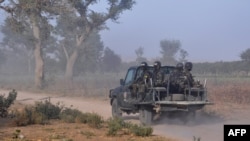During a visit to Cameroon, Nigerian officials Thursday asked for the return of more than 1,000 former Boko Haram militants to Nigeria. Hundreds of the Islamist group’s former fighters have surrendered in Cameroon since May, when the terrorist group’s leader was killed.
Umar Usman Kadafur, the deputy governor of Nigeria's Borno state, greeted former Boko Haram militants at the disarmament center in Meri, a town near Cameroon’s northern border with Nigeria. He spoke with the militants in Hausa, a language used in northern Cameroon and southeast Nigeria.
Kadafur visited Cameroon’s Far North region on Thursday, and led a delegation of 14 Nigerian lawmakers, lawyers, administrators and rights group representatives, to negotiate the voluntary return of former Nigerian Boko Haram militants.
Among the former militants attending the meeting where Kadafur spoke was 34-year-old Kadir Hassan. Hassan said he escaped from the Sambisa Forest, a Boko Haram stronghold on the Cameroon-Nigeria border, in August.
Hassan said Boko Haram commanders deceived him in March of last year, saying he should leave Kukawa, a town in Nigeria’s Borno state, for a job. However, when he arrived in the Sambisa Forest, he was given a gun instead of the job he was promised. He said since the death of the jihadist group’s leader, Abubakar Shekau, in May, several hundred fighters have been struggling to escape from the Sambisa Forest.
Hassan said he escaped alongside 35 combatants and surrendered to the Multinational Joint Task Force of the Lake Chad Basin that is fighting the jihadist group. The task force is made up of troops from Niger, Cameroon, Chad and Nigeria. He said the task force later took them to the DDR, or demobilization center in Meri.
Midjiyawa Bakari, the governor of Cameroon’s Far North region that borders Nigeria’s Borno state and is said to be an epicenter for jihadist groups including Boko Haram, says Cameroon has been overwhelmed with former militants since Shekau was killed.
“We have more than 1,000 Nigerians here, all of them from Borno state. At the end of the rainy season, they will go back home. We congratulate Governor Babagana Umara [of Nigeria’s Borno state]. He sent a commission here to accompany those Nigerians to go back home,” he said.
Bakari said the delegation from Borno state will register former militants who are planning to return to Nigeria voluntarily. He said heavy rains on the Cameroon and Nigeria borders make it difficult for the ex-combatants to return this week. Nigeria and Cameroon agreed to facilitate returns during a security meeting held from August 26 to August 28 in the Nigerian capital, Abuja.
Umar Usman Kadafur deputy governor of Borno state says the ex-militants will go back to Nigeria by November, when heavy rains are likely to decrease.
“I know your facilities are overstretched. We will try as much as possible to repatriate these surrendered Boko Haram members back to our land in Nigeria so that you [Cameroon] can have free space in the DDR centers and we remain grateful for all what you have been doing for our people,” Kadafur said.
In August, Cameroon said it was negotiating to return the ex-militants to Nigeria as the DDR centers in northern Cameroon were becoming overcrowded. Cameroonian officials said the centers host former militants from Chad, Cameroon and Nigeria.




